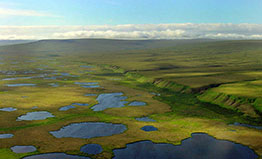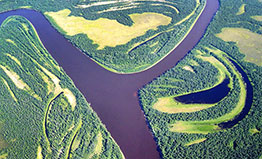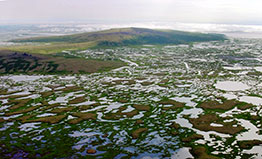Nunangualiaput/Our Maps
"Elicarnarqaput makut kinguqliput makut atritnek." /We must teach our young people their [place] names. — Ray Waska, Emmonak, January 2012
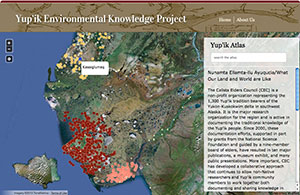 Beginning in 2007, Calista Elders Council, now Calista Education and Culture (CEC), has worked with elders from Bering Sea coastal communities to document Yup'ik place names. This work was initiated and encouraged by CEC's Board of Elders as well as community members. Elders showed a strong desire to teach young people the rich history and named places of their homeland, including camp and settlement sites, rivers, sloughs, rocks, ponds, even sandbars and underwater channels. During our work together community members shared more than 3,000 names as part of three ongoing CEC projects and two previous regional place name projects.
Beginning in 2007, Calista Elders Council, now Calista Education and Culture (CEC), has worked with elders from Bering Sea coastal communities to document Yup'ik place names. This work was initiated and encouraged by CEC's Board of Elders as well as community members. Elders showed a strong desire to teach young people the rich history and named places of their homeland, including camp and settlement sites, rivers, sloughs, rocks, ponds, even sandbars and underwater channels. During our work together community members shared more than 3,000 names as part of three ongoing CEC projects and two previous regional place name projects.
Learn More
Ayagyuaput Pitekluki Caliukut / WE WORK FOR THE SAKE OF OUR YOUNG PEOPLE
The elders we work with are dedicated to documenting traditional knowledge, especially place names. They do this for the sake of their young people.
As Denis Sheldon of Alakanuk said:
"Especially if our young people forget about the land and the names and the hunting places and those rivers, it's like they will lose some of their body parts. But if they learn more about their identity, their minds will be stronger."
Alakanuk elder Lawrence Edmund agreed:
"When they travel [without knowing place names], it's like they are lost [in a storm]."
Elders are committed to sharing their knowledge, both through books and on the computer. Emmonak elder Ray Waska was adamant in his desire that our mapping work not be hidden from people but be made available for all to see:
"I'm pushing for this map to be shown to the young people and not kept hidden. Or if they want to see it in school or in a particular class, as you know there are Yup'ik classes in schools, then they can display it on the computer and listen to a person who is speaking over there. That's what I'm thinking, to show it to our young people and not keep it hidden."
Nelson Island elder Paul John explained that sharing knowledge is like sharing food. If it is difficult to obtain in one community, those who have it must share with those who do not:
"According to the traditional teachings, they were told to receive one who is trying to subsist and to help him obtain food without making the excuse that he is from another village. If these [maps and stories] are open [to the public], it will be like that."
Learn more
Makunun young-alrianun maniarkaugaput, iirumavkenaki / We have to show them to our young people, not hide them
 Waten pirraarluta, waten makunun young-alrianun maniarkaungataput, iirumavkenaki. Waten qanelrianek elitarkauniluki makut maa-i kinguliaput. Waten maninrilkumteki nani uitaciqut yuum-llu niiteksaunaki, tangeqsaunaki-llu.
Waten pirraarluta, waten makunun young-alrianun maniarkaungataput, iirumavkenaki. Waten qanelrianek elitarkauniluki makut maa-i kinguliaput. Waten maninrilkumteki nani uitaciqut yuum-llu niiteksaunaki, tangeqsaunaki-llu.
Taugken paivngakan makut yun'erraat, waten-llu computer-aamun piluteng, tangerrluteng, qang'a-ll' paqnayugluteng, nunat atritnek paqnayukuneng tuaggun tangerciqait, qang'a-ll' makut qanemciit niiqurluki. Tua-i qanerturalriani elpeci niiskunici tua-i, tua-i erinan-llu cakanirpek'nani tuaten ayuqeciqellria tua-i. Iliita quyaluni iliita-ll' aturciqaa, qang'a-ll'  makunek-llu nunarrarnek kangingluki qayuw' ayuqellritnek.
makunek-llu nunarrarnek kangingluki qayuw' ayuqellritnek.
After doing this [work], I think we have to show it to young people, not hide it from them. We have to tell our young people that they have to learn from people who are speaking. If we don't show them, they will be [lost] somewhere and a person won't hear them and won't see them.
But if [these maps] are displayed, these young people will go on the computer and see, or if they are curious about the names of villages, they will see them through that [map] or they will hear these stories. If they hear those of you who are talking, your voice will stay the same and won't change. Some people will be grateful and will use it, or they will learn what these small villages were like.
Ray Waska, Emmonak
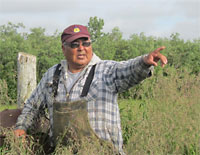
WHY PLACE NAMES ARE IMPORTANT
Nerangnaqsaraput yuutekaput, nangerngatkaput / Our subsistence way of life keeps us alive, it keeps us standing
Men and women in coastal communities continue to hunt, fish, and gather greens in the areas surrounding their villages. Knowing the named places where foods are available has always been important for survival.
Kongiganak elder John Phillip (January 2011) explained:
"Since our subsistence way of life keeps us alive, since it keeps us standing, that's something that I teach in my village. I also bring my grandchildren and great-grandchildren with me out to the wilderness; I bring them with me to check blackfish traps and tell them about those places.
Just like that, we especially try to carry on these ways that are most important. Concerning our land, our ancestors told us, "The area around your village is something that you must endeavor to pass on from generation to generation. Inside that land, you can eat as much as you want, taking whatever is available."
Learn more
Tan’gurraat ellicalteng aturluku piyarameggni nerangnaqtullruut / Using what they’ve been taught, young men used customary places.
 Tua-i taugken tua-i tauna tan'gurraq piiyaurcami atauciinek qimugtengqerrlallruameng tamaani tua-i, tauna nallunriaki atii maligtevkenaku tauna ayaglalliniuq tauna.
Tua-i taugken tua-i tauna tan'gurraq piiyaurcami atauciinek qimugtengqerrlallruameng tamaani tua-i, tauna nallunriaki atii maligtevkenaku tauna ayaglalliniuq tauna.
Maa-i makut ellaita elicallrit, atameggnek elitellerteng tamana aturluku. Piyarameggnun tua-i civqurluki taluyiryarateng-llu tua-i taluyiryaraqluki. Aarnarqellriit-llu nalluvkenaki.
Tamaa-i tamaani qayatgun taugaam pektetullermeggni tua-i alerquutekluku ukuk wani ukut fish rack-at imkut naparyait unitaarluki pisqevkenaki, tuavet tekiskuni tua-i taukut arenqilitekciqniluki yuaravkenani. Tamaa-i  elliqeryarangvailegmeng caperrnarqut tamakut yuut tamaani.
elliqeryarangvailegmeng caperrnarqut tamakut yuut tamaani.
But when a young man started to make a living, since they only had one dog back then, when he learned [places], that [young man] evidently traveled without his father.
They used what they taught them, what their fathers taught them. They continually set [their traps] where they usually set them, and places where they usually set their blackfish traps, those were places where they customarily set their blackfish traps. And they knew dangerous areas.
Back when they used to travel only by kayak, it was their instruction not to leave the fish rack posts, that if one reaches [those posts] they will help him as he won't have to search for any other place [to dry salmon]. Before they got outboard motors, those people led difficult lives in the past.
Benedict Tucker, Emmonak
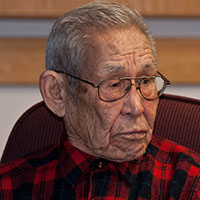
Elitaqiyuunateng maa-i una taugaam puukallerkateng kiingan/They no longer recognize places today, but are only concerned about bumping into things
Elders emphasized that knowing place names was important for safe travel. Only by knowing the names could people avoid dangerous places and let others know their location when they were lost.
As Denis Sheldon said:
"When this [map] is displayed, young people will learn it. This map will be of help, and if they happen to encounter danger in the wilderness, if they don't know where that village is, [their location] will be hard to find. But if they know the names of places when they find them, if they need to search for them, their location will be known."
Mark John agreed:
"If our young people learn place names, they won't say, 'I'm heading up [inland].' But they will say their real names, that they will be traveling to that specific place. And if they happen not to return, [people] will know where they are and can search for them."
Learn more
Makut maa-i piicunairutut nunanguat / One can no longer be without these maps
 Ilumun-wa makut maa-i piicunairutut makut maa-i. Nunamta avatiini ayagyaraput aarnarqetulit-llu makut apertuumaciqait. Makut kinguliamta caneq nalluat, ilumun aarnarqellriit-llu cikyuilnguut-llu nalluluki. Tamakut tamaa-i uuggun irniaci tut'garaci-llu alerquumaarkaugaci. Qan'ga-llu Kuigpagmi unani cikuyuilnguut nalluit makut, picurlagalalriit kuigni-ll' uksuarmi-llu. Ayagayaraci tamakut tua-i atrit apertuumaluki pinarqaci.
Ilumun-wa makut maa-i piicunairutut makut maa-i. Nunamta avatiini ayagyaraput aarnarqetulit-llu makut apertuumaciqait. Makut kinguliamta caneq nalluat, ilumun aarnarqellriit-llu cikyuilnguut-llu nalluluki. Tamakut tamaa-i uuggun irniaci tut'garaci-llu alerquumaarkaugaci. Qan'ga-llu Kuigpagmi unani cikuyuilnguut nalluit makut, picurlagalalriit kuigni-ll' uksuarmi-llu. Ayagayaraci tamakut tua-i atrit apertuumaluki pinarqaci.
Ilumun cukariluteng maa-i cat kituurtaarluki murilkevkenateng pilaameng. Wangkuta tamaani tan'gurrarni atamta ayagyarameggnun ayaulluta mikluta ayautelallruitkut, apertuuqurluta, "Kuik cikyuituq man'a, aarnarquq, uksurpak-llu."
Maani wani yuilqumi uqviarilngurmi-llu nunapigmi pavani qang'a-ll' imarpigmi unani, tamakut piyaraci nallunrikeci tua-i atrit apertuumaluki, aarnarqetulit-llu.
atrit apertuumaluki, aarnarqetulit-llu.
Indeed one can no longer be without these [maps] anymore. These things will reveal the places where we travel and places that are dangerous. Our young people indeed don't know how to do things, and they don't know the dangerous areas and places that don't freeze. You have to instruct your children and grandchildren through this [map]. And they don't know the places down on the Yukon River that don't freeze, and as you know, they get into accidents in rivers in the fall also. You have to reveal the names of the places where you travel.
Indeed it's because they are traveling at faster speeds today and pass things and don't pay attention. We boys in the past, our fathers would bring us to places where they usually traveled and would bring us along, continually telling us, "This river doesn't freeze; it's dangerous and [doesn't freeze] all winter."
In the wilderness or up on the tundra where there are no willows or alders or down on the ocean, you know the names of the places where you usually travel, and reveal their names and places that are usually dangerous.
Benedict Tucker, Emmonak
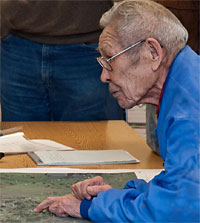
Piciryaraput alaicetlaraat/They make our customs visible
Elders also shared place names and stories as part of their efforts to ensure that their valued traditions remain visible in this rapidly changing world.
Alakanuk elder Fred Augustine said:
"One day as we are living, people will ask us if we are Yup'ik people, and we will say, 'Yes.' [They will ask,] 'Where are your Yup'ik customs and ways?' They will look for them, but if this [map] wasn't finished well, [these customs] will be gone. This [map] here will demonstrate the 'qaneryarat' [words of wisdom].
If we do a good job recording [place names on this map] the hardships that Yup'ik people will face in the future will be less. This is something to be grateful for."
Learn more
Tua-i taum Agayutem piliaqestemta ellam iquklitellranun piciryararkiutekellruyaaqluki / God gave us these ways to live until the end of the world's existence
 Taqestengqertukut cam tamarmi piliaqestiinek. Taum-llu piliaqestemta ellam yuini atlirtuumamta piciryararkitellruyaaqluta ella taugaam iqukliskan nang'arkanek. Ellam agellrani atuurkauluku piciryararkiutni tauna taisngallruyaaqluku ayuqenrilngurnun wangkutnun ellam yuinun. Piciryaraput-llu ayuqevkenateng, camkuungermeng-llu allakarmeng piciryararluteng.
Taqestengqertukut cam tamarmi piliaqestiinek. Taum-llu piliaqestemta ellam yuini atlirtuumamta piciryararkitellruyaaqluta ella taugaam iqukliskan nang'arkanek. Ellam agellrani atuurkauluku piciryararkiutni tauna taisngallruyaaqluku ayuqenrilngurnun wangkutnun ellam yuinun. Piciryaraput-llu ayuqevkenateng, camkuungermeng-llu allakarmeng piciryararluteng.
Tua-i taum Agayutem piliaqestemta ellam iquklitellranun piciryarkiutekellruyaaqluki. Taugaam wangkuta Yup'ignek aprumalrianek Alaska-rmiuni Inupiat, Indian-at, Aleut-at alartellerput una nallunaitqapigtuq. Mat'uggun school-akun qang'a-ll' agayumacikun, tamaa-i piciryararkiutellra Agayutem katallruarput tamaaggun.
Man'a maa-i piciryararkiutvut Agayun umyuaqekumteggu, ellam taugaam iquklitellranun yaavet iqungarkauluku piciryararkicimayaaqellerput umyuaqekumteggu iirumayugyanritaput ukanirpak ciuliamta callrat. Kingumta yuitnun, tangerrluki taugaam maniluki, 'Waten cunaw' ciuliaput pitullruyaaqelriit.' Taringenrullerkaatgun pikumteggu, Agayun ukvekek'umteggu piciryararkicesteksaaqellerput ellam taugaam iquklitellrani nang'arkamek, tua-i tuaten umyuangqerqumta iirumayugyanritaput kingumta yuitnun, irniamtenun, tut'garamtenun,  iluperamtenun tamaa-i.
iluperamtenun tamaa-i.
We have a creator who created everything. And the one who created those of us in this world, along with those living below us, actually gave us customs to live by that would only end when the world no longer exists. He actually gave different people of this world ways to live by to be used as the world continued to exist. And our ways vary, and even people down [in the lower forty-eight states] have their own customs and traditions.
God who created us actually gave us those ways to live by until the end of the world. But those of us called Yup'ik people, people from Alaska, the Inupiat, Indians, Aleuts, it is obvious that we made a mistake. Through school or through religion, we lost the traditions and customs that God gave us.
The traditions and customs we were given, if we keep God in mind, if we keep in mind that we were given customs and traditions to live by until the world ended, we wouldn't want to keep our ancestors' ways hidden. To our young people, looking at them, we would display those things to them, [and they would think] "So this is evidently what our ancestors used to do.' If we do it in a way that we further understand it, if we believe in God, the one who gave us traditions and customs to live by that would only end when the world no longer existed, if we think like that, we wouldn't want to hide it from our young people, from our children, our grandchildren, from our great-grandchildren.
Paul John, Toksook Bay
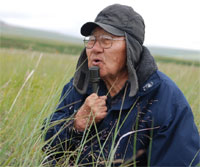
Tua-i anerteqerrlainarngailamta wangkuta/Because we won't always live
Contemporary elders were anxious to share their knowledge, as they are the last generation to become aware and grow to adulthood in the years before the rapid changes that came with extended non-Native contacts in southwest Alaska. Although there will always be elders, the generation of men and women who as children listened to their own elders in the qasgi (communal mens' house) and home, and hunted and traveled with dog teams and kayaks, is passing away. The stories they share are their legacy.
Benedict Tucker said:
"Since we won't always be alive, I'm pushing this work to continue to the best of our ability. These [teachings] will help them even if they're white people. Continue to move it forward, it will get stronger in the future. As Yup'ik people, our Yup'ik ways, starting from our ancestors, mustn't be completely lost."
Allat-llu elitnaurciqaput/We will also teach others
Elders emphasized that what they shared was for everyone. Through sharing their customs and traditions they hope to educate non-Natives in their unique ways of life, so as to gain their respect. Mark John declared:
"Some time ago, when we asked the Calista Elders Council board, when they spoke and said to display our work to people and not close it off to anyone, I was extremely happy.
I'm also pushing for our work on Yup'ik ways in that way. Our children and grandchildren won't be the only ones we'll teach, but we will also teach others. And through what they've learned, they will have more respect for us."
Learn more
Tang makut qigcignarqellriamek yuucingqellinilriit /These people evidently have ways of living that should be respected
 Ilaita tua-i nallustemta tua-i qigcikevkenata tangssularaakut tua-i-w' nalluamtegtekut. Taugken imumek waten nasvagluku piciryararput piurqumteggu ellaita-ll' elilluteng, waten qanerciqut, 'Tang makut qigcignarqellriamek yuucingqellinilriit tua-i-w' ellmeggnek qigcikameng cali nunateng man'a qigcikluku.' Tamana tamaa-i elitnaurullugpauciquq allanun
Ilaita tua-i nallustemta tua-i qigcikevkenata tangssularaakut tua-i-w' nalluamtegtekut. Taugken imumek waten nasvagluku piciryararput piurqumteggu ellaita-ll' elilluteng, waten qanerciqut, 'Tang makut qigcignarqellriamek yuucingqellinilriit tua-i-w' ellmeggnek qigcikameng cali nunateng man'a qigcikluku.' Tamana tamaa-i elitnaurullugpauciquq allanun  yugnun. Wangkutnun-llu tua-i tangssullrat cimirluni.
yugnun. Wangkutnun-llu tua-i tangssullrat cimirluni.
Some people who don't know who we are don't have respect for us when they see us because they don't know what we're like. But if we continually show our traditional ways, they will learn also, and this is what they'll say, "These people evidently have ways of living that should be respected since they respect themselves and they also respect their land." That will be a big teaching tool to others. And they will start to view us differently.
Mark John, Toksook Bay and Anchorage
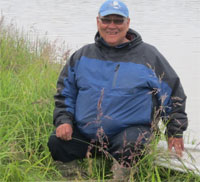
Caliaput ikayuutnguciquq Yup'iullemta tungiinun/This work will strengthen our Yup'ik identity
Among the most important reasons elders support this work is their belief that knowledge and understanding of the land and sea can strengthen a person's Yup'ik identity.
Denis Sheldon shared:
"If our young people learn more about the land, it will be like we have a stronger identity and our minds will be stronger."
As John Phillip said:
"From the beginning, we were born as Yup'ik people. But a Yup'ik person's Yup'ik identity, being a Yup'ik person like this, and following the Yup'ik way of living, that person is also living by sustaining himself from foods from the land where he is born. That person is living off the land, using his Yup'ik way of being."
Lakes to the south of Nelson Island, 2003.
Credit: Jeff Foley
A slough of the Yukon River. Tannin from the peat moss gives it its deep brown color.
Credit: Jeff Foley
Toksook Bay at the mouth of the Toksook River, 2003. The shallow bay is less than ten meters deep where it enters Etolin Strait.
Credit: Jeff Foley
The coastal plain of the Yukon-Kuskokwim delta, south of Scammon Bay, 2003.
Credit: Jeff Foley

